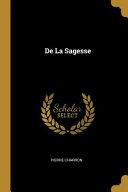
“The true science and study of man is man.”
Book I, Preface, as quoted in The Oxford Dictionary of Quotations (1999) by Elizabeth M. Knowles
De la sagesse (1601)

This work has been selected by scholars as being culturally important, and is part of the knowledge base of civilization as we know it. This work was reproduced from the original artifact, and remains as true to the original work as possible. Therefore, you will see the original copyright references, library stamps (as most of these works have been housed in our most important libraries around the world), and other notations in the work. This work is in the public domain in the United States of America, and possibly other nations. Within the United States, you may freely copy and distribute this work, as no entity (individual or corporate) has a copyright on the body of the work. As a reproduction of a historical artifact, this work may contain missing or blurred pages, poor pictures, errant marks, etc. Scholars believe, and we concur, that this work is important enough to be preserved, reproduced, and made generally available to the public. We appreciate your support of the preservation process, and thank you for being an important part of keeping this knowledge alive and relevant.
“The true science and study of man is man.”
Book I, Preface, as quoted in The Oxford Dictionary of Quotations (1999) by Elizabeth M. Knowles
De la sagesse (1601)
Book II, Ch. 5, p. 345, as quoted in Atheism from the Reformation to the Enlightenment (1992) edited by Michael Cyril William Hunter and David Wootton, p. 99
De la sagesse (1601)
Context: All Religions have this in common, that they are an outrage to common sense for they are pieced together out of a variety of elements, some of which seem so unworthy, sordid and at odds with man’s reason, that any strong and vigorous intelligence laughs at them; but others are so noble, illustrious, miraculous, and mysterious that the intellect can make no sense of them and finds them unpalatable. The human intellect is only capable of tackling mediocre subjects: it disdains petty subjects, and is startled by large ones. There is no reason to be surprised if it finds any religion hard to accept at first, for all are deficient in the mediocre and the commonplace, nor that it should require skill to induce belief. For the strong intellect laughs at religion, while the weak and superstitious mind marvels at it but is easily scandalized by it.